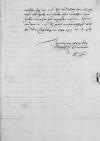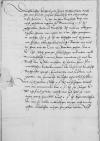 GStA PK, HBA, C1 No 838, 1r
GStA PK, HBA, C1 No 838, 1r
Durchlauchter, hochgeborner furst, hochgunstiger, lieber her und freundt. / Unsere freuntliche und vleis willige dinste zuvoran. /
Wie die hern ⌊konigliche rethe⌋ aus negst gehaltner ⌊tagfart⌋ zu ⌊Marienburg⌋ E(wer) F(urstlichen) D(urchlauch)t geschrieben, / haben sie ⌊konigliche m(aieste)t⌋, unsernn allergnedigisten herren, / von wegen der littauischen grentzenn, / in welchen sich E(wer) F(urstliche) D(urchlauch)t der billigheit nach beschweret, / mit hochem vleis schriftlich ersucht, / bittende, / wie auch die ⌊hern aus der Cron⌋ von ⌊Peterkaw⌋ gethan, / das ir ko(nigliche)r m(aieste)t solche grentzen zubesichtigen und ortern / wolde unvordechtliche commissarien vorordnen / etc. und den brieff dem edlen, ernfesten h(ern) ⌊Fabian Zeme⌋, pommerellischem underkemmerer, / der dazumal koniglicher botschaffter gewest, / zuantworten / und furderen mitgegeben / der zuvorsicht, / der sachen ersprislich zusein, / uns auch gebeten, / solchs E(wer) F(urstlichen) D(urchlauch)t an zu zeigen. / Dieweil wir dan vornommen, das E(wer) F(urstliche) D(urchlauch)t zu ⌊junger ko(nigliche)r m(aieste)t⌋ ehefreud geladen, / welchs uns fast lÿeb ist, / wirt dieser grentz hanndell / durch E(wer) F(urstlichen) D(urchlauch)t kegenwertigheit, / die wir zu vielen notturftigen dingen nicht unnutz achten, / fueglichen mugen hingelegt werden, / uff  GStA PK, HBA, C1 No 838, 1v welchen zog wir E(wer) F(urstlichen) D(urchlauch)t von Gotte dem almechtigen vill heiles und gluckes thun wunschen. / Wir hoffen, das unser soll vorgessen werdenn, / hiemit wir uns in E(wer) F(urstlichen) D(urchlauch)t gunst und freuntschafft befelhen. /
GStA PK, HBA, C1 No 838, 1v welchen zog wir E(wer) F(urstlichen) D(urchlauch)t von Gotte dem almechtigen vill heiles und gluckes thun wunschen. / Wir hoffen, das unser soll vorgessen werdenn, / hiemit wir uns in E(wer) F(urstlichen) D(urchlauch)t gunst und freuntschafft befelhen. /
⌊Ioannes⌋, von Gots gnaden bischoff zu ⌊Ermelandt⌋ /
manu p(ro)pria s(ub)s(cripsi)t
 GStA PK, HBA, C1 No 838, 1v welchen zog wir E(wer) F(urstlichen) D(urchlauch)t von Gotte dem almechtigen vill heiles und gluckes thun wunschen. / Wir hoffen, das unser soll vorgessen werdenn, / hiemit wir uns in E(wer) F(urstlichen) D(urchlauch)t gunst und freuntschafft befelhen. /
GStA PK, HBA, C1 No 838, 1v welchen zog wir E(wer) F(urstlichen) D(urchlauch)t von Gotte dem almechtigen vill heiles und gluckes thun wunschen. / Wir hoffen, das unser soll vorgessen werdenn, / hiemit wir uns in E(wer) F(urstlichen) D(urchlauch)t gunst und freuntschafft befelhen. /


